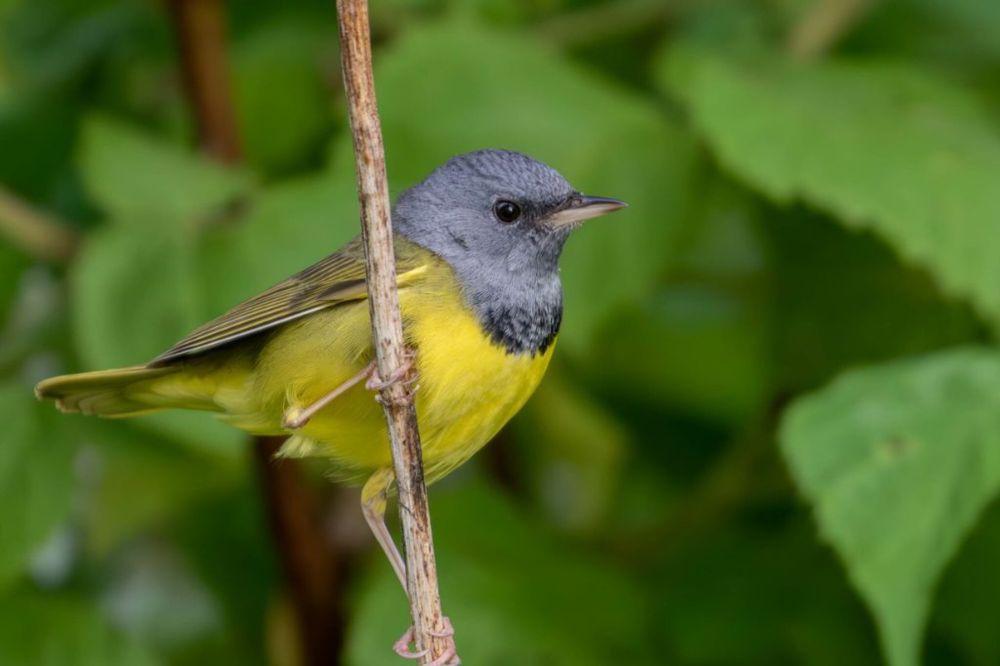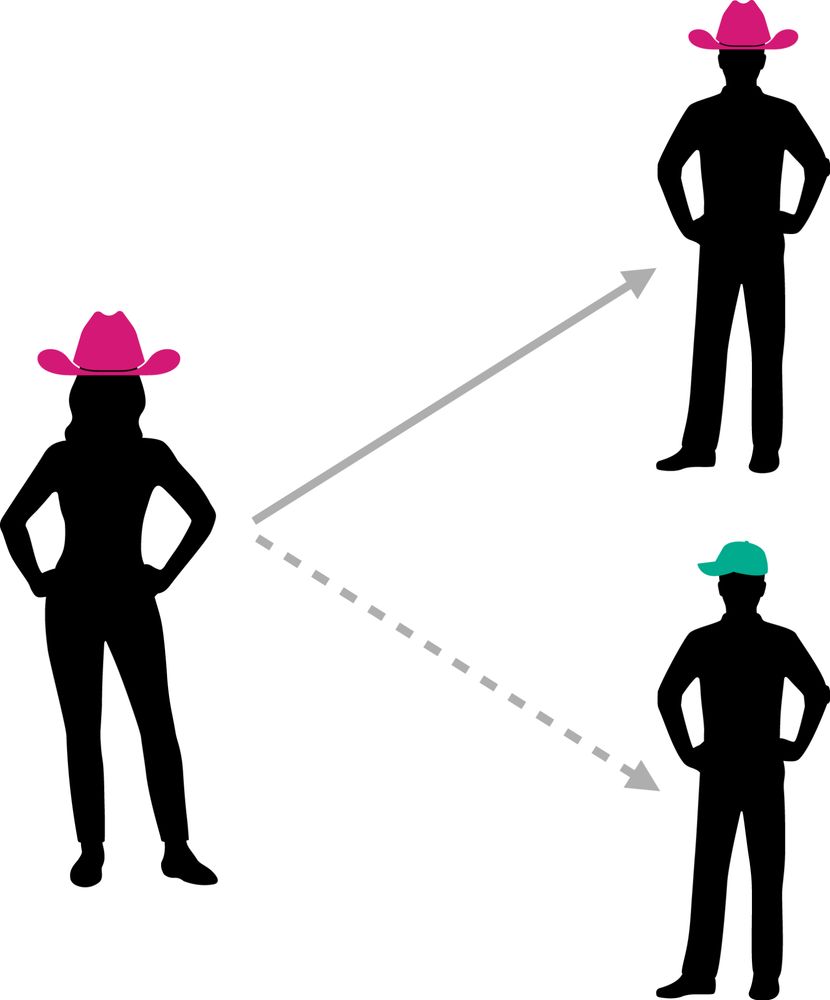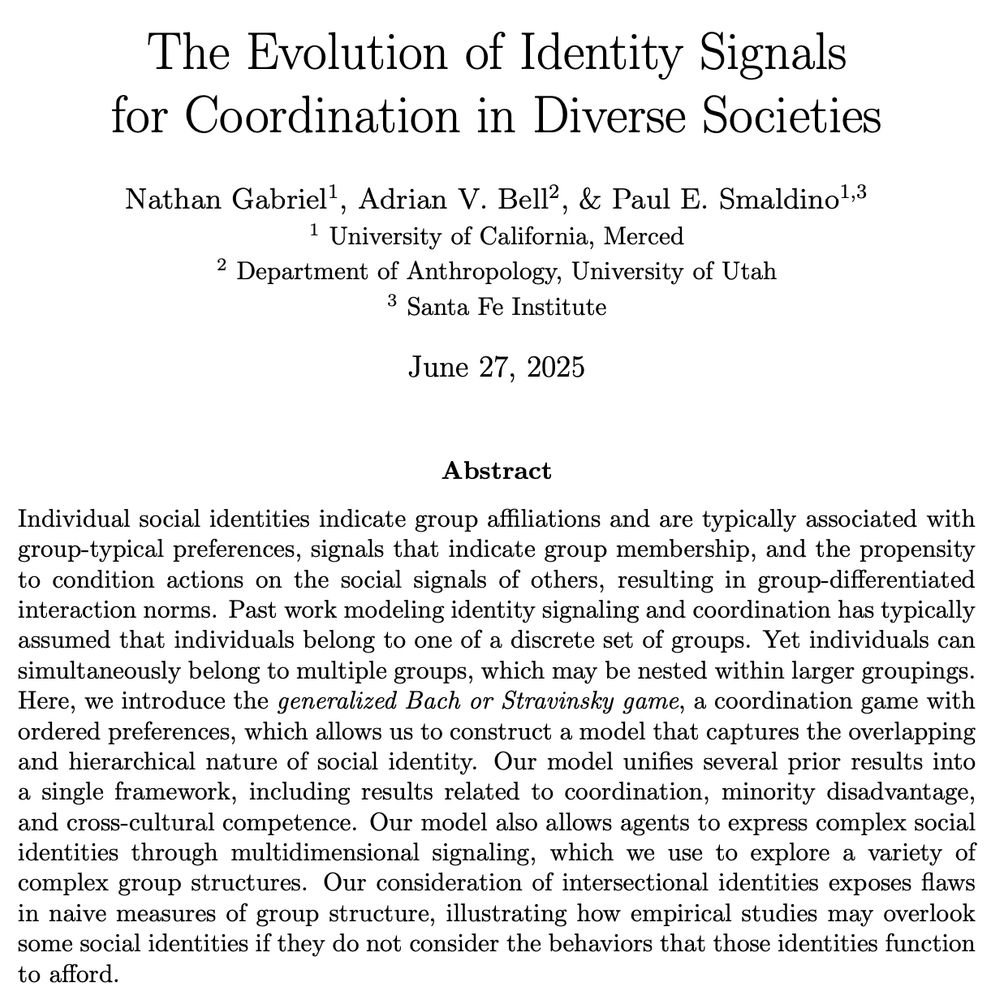
Individual social identities indicate group affiliations and are typically associated with 3 group-typical preferences, signals that indicate group membership, and the propensity to condition actions on the social signals of others, resulting in group-differentiated interaction norms. Past work modeling identity signaling and coordination has typically assumed that individuals belong to one of a discrete set of groups. Yet individuals can simultaneously belong to multiple groups, which may be nested within larger groupings. Here, we introduce the generalized Bach or Stravinsky game, a coordination game with ordered preferences, which allows us to construct a model that captures the overlapping and hierarchical nature of social identity. Our model unifies several prior results into a single framework, including results related to coordination, minority disadvantage, and cross-cultural competence. Our model also allows agents to express complex social identities through multidimensional signaling, which we use to explore a variety of complex group structures. Our consideration of intersectional identities exposes flaws in naive measures of group structure, illustrating how empirical studies may overlook some social identities if they do not consider the behaviors that those identities function to afford.
New preprint w/ Nathan Gabriel & @avbell.bsky.social: The Evolution of Identity Signals for Coordination in Diverse Societies
The model tackles multiple nested/overlapping identities and complex signaling structure. Recovers lots of old results and adds several new ones osf.io/preprints/so...
01.07.2025 14:58 — 👍 33 🔁 10 💬 1 📌 0
Job announcement 🚨: paid fieldwork opportunity with Sanguatsiniq research project! Details in thread ⬇️ Please share!
07.05.2025 09:00 — 👍 27 🔁 38 💬 1 📌 2
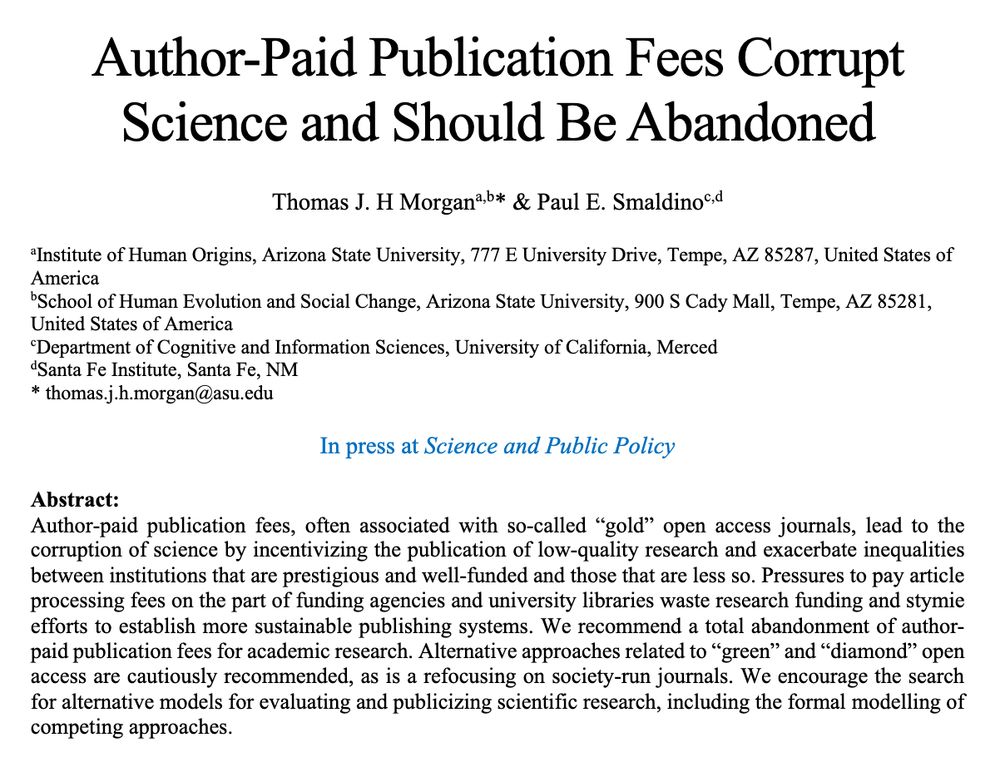
Author-Paid PublicationFees Corrupt Science and Should Be Abandoned
Thomas J. H Morgan & Paul E. Smaldino
As grant money starts drying up, it's more important than ever not to waste it on paying publishers' open access "article processing fees" when we can host PDFs for free. Tom Morgan and I wrote a paper on this, forthcoming at Science and Public Policy. Accepted draft here: osf.io/preprints/os...
09.05.2025 17:26 — 👍 360 🔁 117 💬 9 📌 17
OSF
Here's the stable link to the most recent version 👀
osf.io/preprints/ps...
10.04.2025 07:48 — 👍 5 🔁 3 💬 1 📌 0
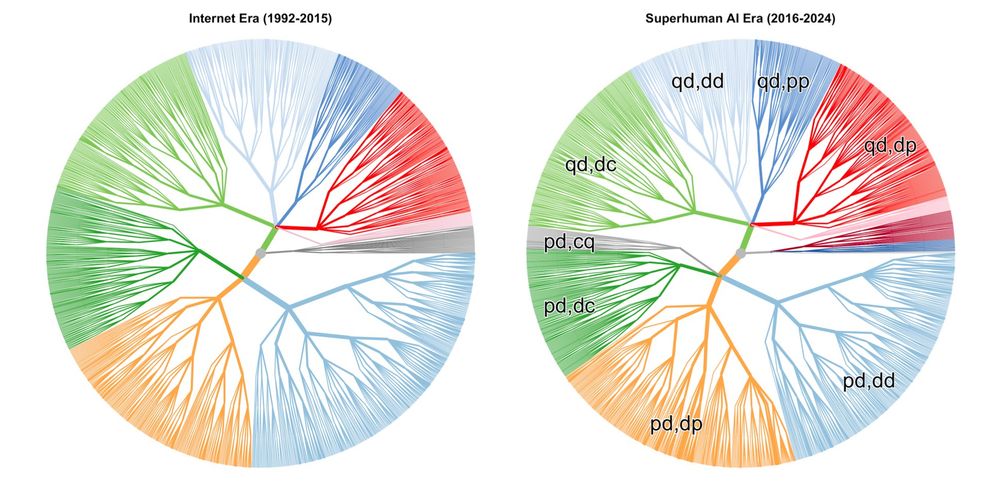
decision trees in human play in the game of go before and after the arrival of superhuman AI, showing gradual change rather than revolutionary disruption
🚨 New preprint! 🚨
I looked at 400+ years of cumulative cultural evolution in the Game of Go from feudalism to superhuman AI. Did AlphaGo etc. completely disrupt human play? No! More like human-machine convergence, rather than revolution.
Check out these decision trees!
osf.io/preprints/ps...
09.04.2025 17:35 — 👍 60 🔁 25 💬 3 📌 2
Merced River, Yosemite National Park
24.02.2025 18:04 — 👍 4 🔁 2 💬 0 📌 0
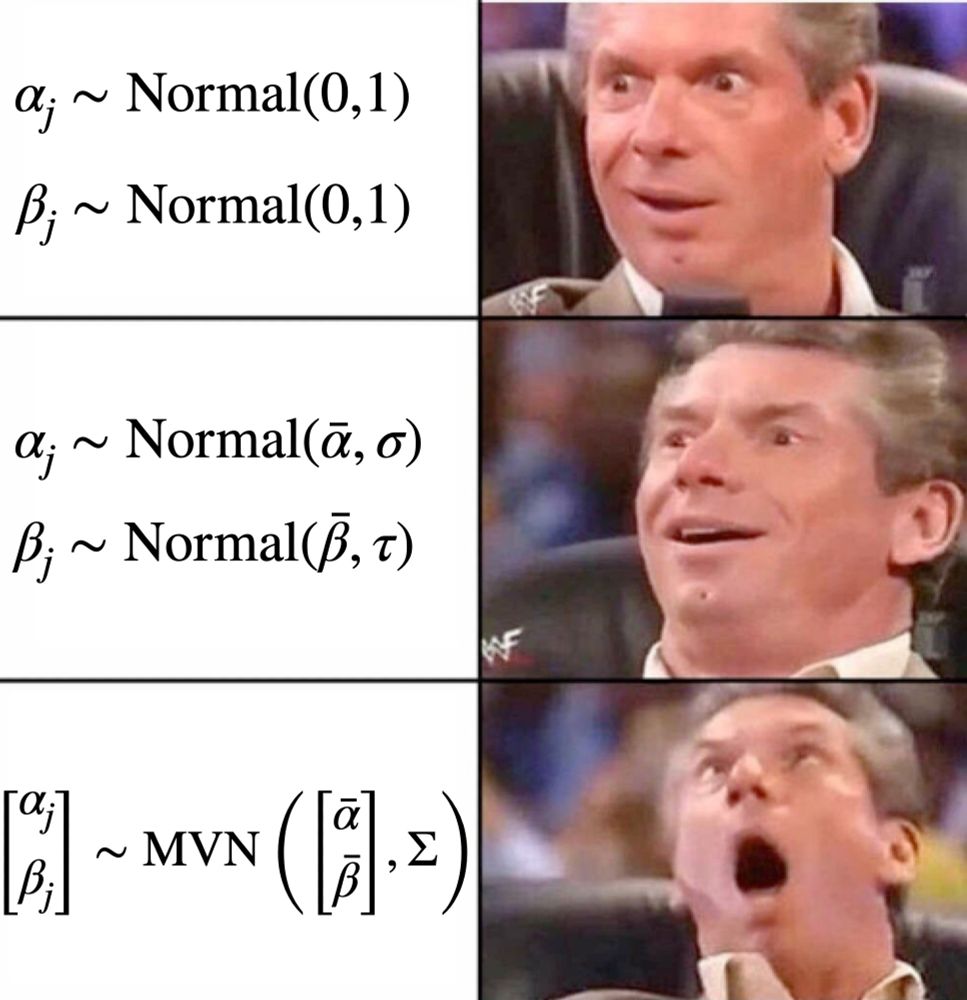
meme with escalating multilevel priors, from fixed to simple random to correlated random effects
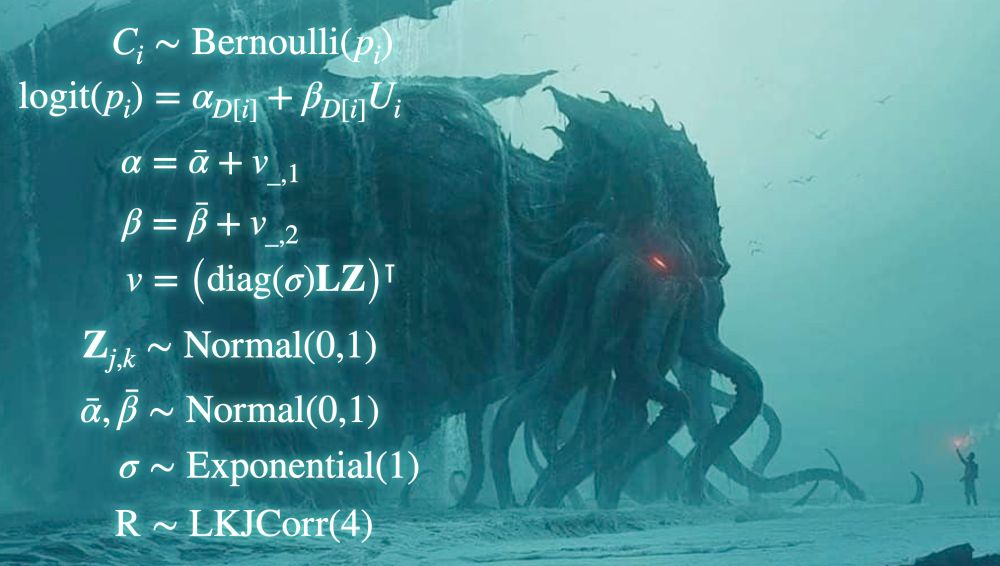
Complex generalized linear multilevel model with an image of a monster emerging from the ocean behind it
Week 7 of my Bayes stats course, now deep in multilevel models, correlated effects, centered and non-centered parameterizations, diag(σ)LZ ph'nglui mglw'nafh Cthulhu R'lyeh wgah'nagl fhtagn (link to lectures: github.com/rmcelreath/s...)
21.02.2025 07:40 — 👍 162 🔁 31 💬 5 📌 2
L'Impératrice
20.02.2025 23:07 — 👍 1 🔁 0 💬 0 📌 0
Sea Power
La máquina de hacer pájaros
El baquiné de Angelitos Negros de Willie Colón
20.02.2025 23:06 — 👍 1 🔁 0 💬 1 📌 0
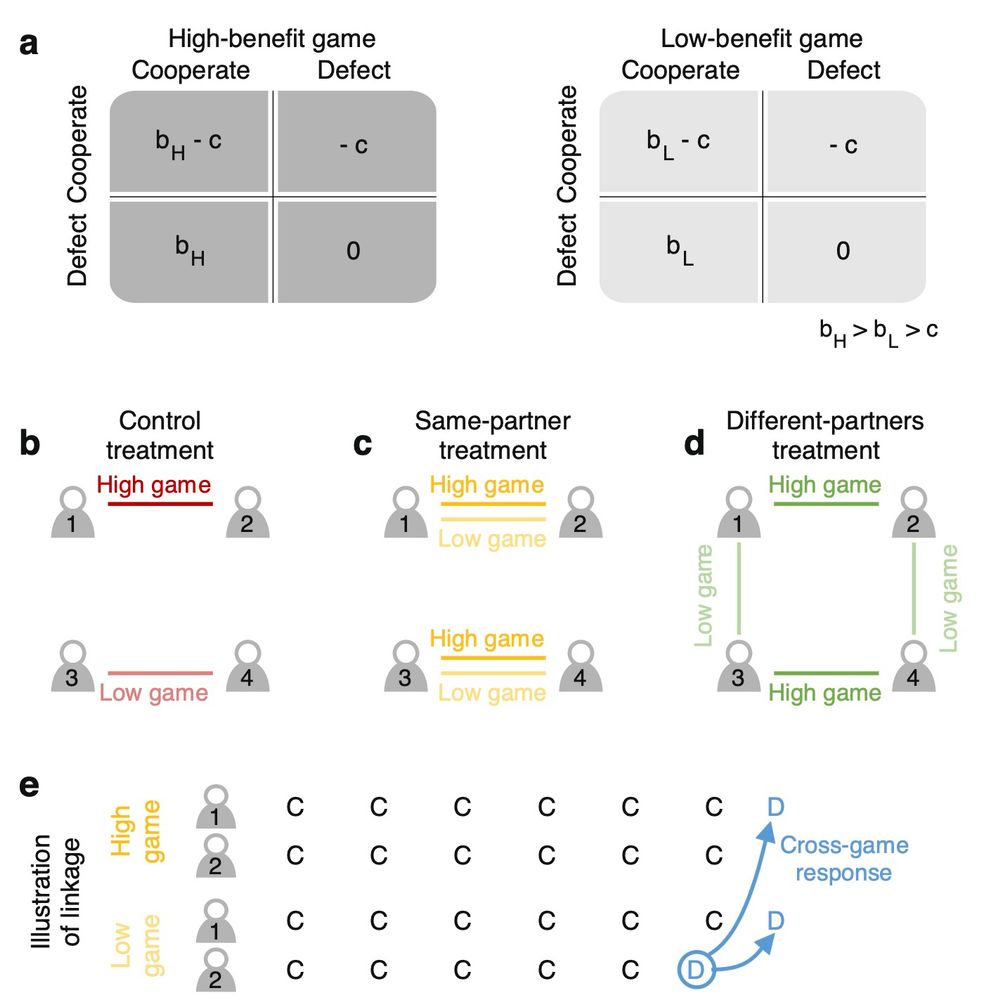
In game theory, we often assume that people only interact in one game at a time. In a new paper, we explore theoretically and experimentally how people cooperate when they engage in two games concurrently, either with the same partner or with different partners, www.nature.com/articles/s41...
12.02.2025 02:32 — 👍 45 🔁 15 💬 5 📌 0
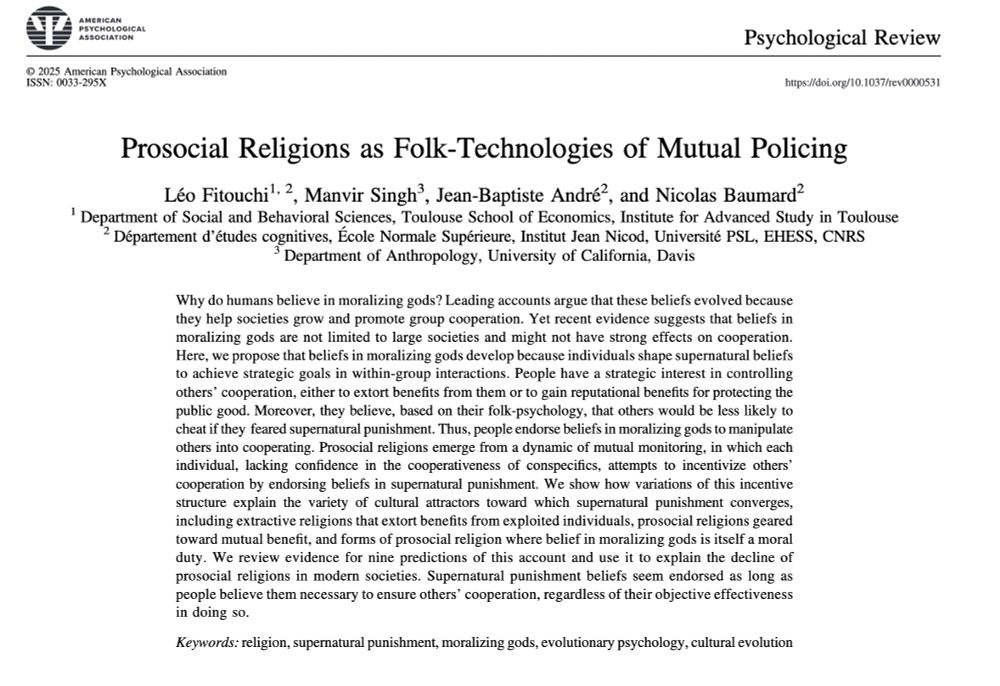
Where do moralizing religions come from? Useless cognitive by-products?Cultural group selection for complex societies?
Our Psych Review paper argues: neither. Let’s rethink their cognitive & evolutionary origins🧵
w/ @manvir.bsky.social @nbaumard @jbaptistandre.bsky.social
doi.org/10.1037/rev0...
11.02.2025 18:20 — 👍 82 🔁 40 💬 6 📌 2
Looking for a first intro to theoretical models in cultural evolution? For yourself or your students? 🔍
In our chapter for an upcoming @ehbea.bsky.social textbook, we outline what models are for, what questions they address, and how they can be coded in R!
Preprint: osf.io/preprints/ps...
06.02.2025 09:29 — 👍 31 🔁 19 💬 3 📌 0

Postdoctoral researcher in social cognition | Masaryk University
Postdoc position available in our team!
We are testing a computational model explaining the decision-making process during in normative/moral situations while incorporating the formative role of culture in this process.
www.muni.cz/en/about-us/...
#socialpsyc
#PsychSciSky
#cogpsyc
06.02.2025 10:14 — 👍 13 🔁 14 💬 1 📌 1
💥Two 💥 post-doc positions open in my @erc.europa.eu ERC-funded group. In an interdisciplinary, collaborative setting, we use different types of modeling (e.g., reinforcement learning) and human experiments to understand social learning and cultural evolution. Get in touch if you have any questions!
07.02.2025 07:56 — 👍 14 🔁 19 💬 1 📌 0
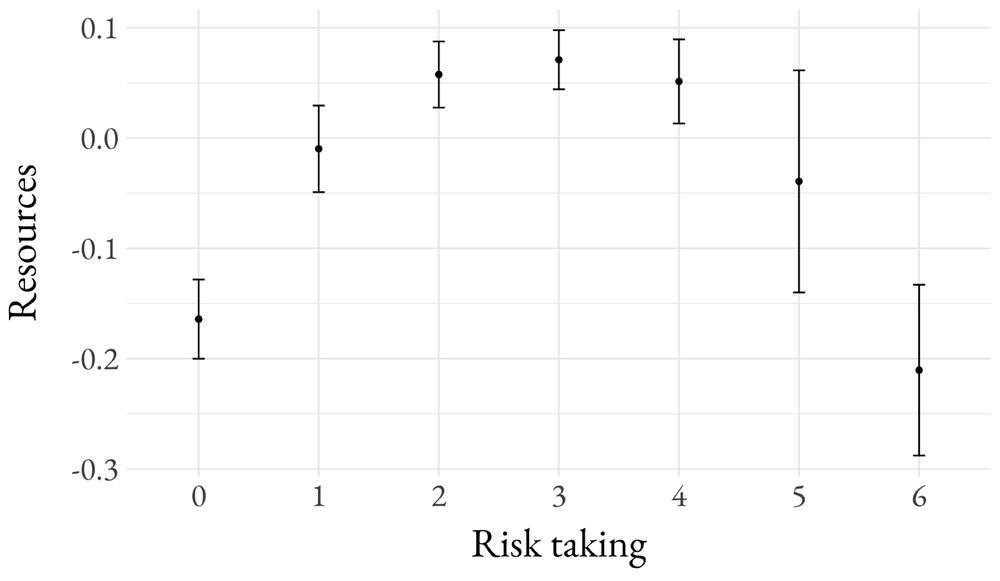
Does poverty lead to risk taking or risk avoidance? Turns out, to both. Our new paper (with D. Nettle & W. Frankenhuis) in @royalsocietypublishing.org explains why, and conducts preregistered tests of our ‘desperation threshold’ model.
royalsocietypublishing.org/doi/10.1098/...
A 🧵
07.02.2025 14:12 — 👍 26 🔁 15 💬 1 📌 1
Andy Whiten and I wrote a @science.org perspective about a cool new study from @inbalarnon.bsky.social @simonkirby.bsky.social @ellengarland.bsky.social et al! They found humpback whale song has language-like statistical structure, using methods inspired by infant language learning 🐋🎶 Links below ⬇️
06.02.2025 19:10 — 👍 73 🔁 20 💬 1 📌 3
Postdoctoral Research Associate
Click the link provided to see the complete job description.
We're hiring! Are you a cultural evolutionary modeller who wants to understand how and why children's peer cultures evolve? Here's a postdoc position for you! @culturalevolsoc.bsky.social @durhampsych.bsky.social @ehbea.bsky.social @eslr.bsky.social
Apply here: durham.taleo.net/careersectio...
14.01.2025 12:38 — 👍 115 🔁 89 💬 1 📌 4
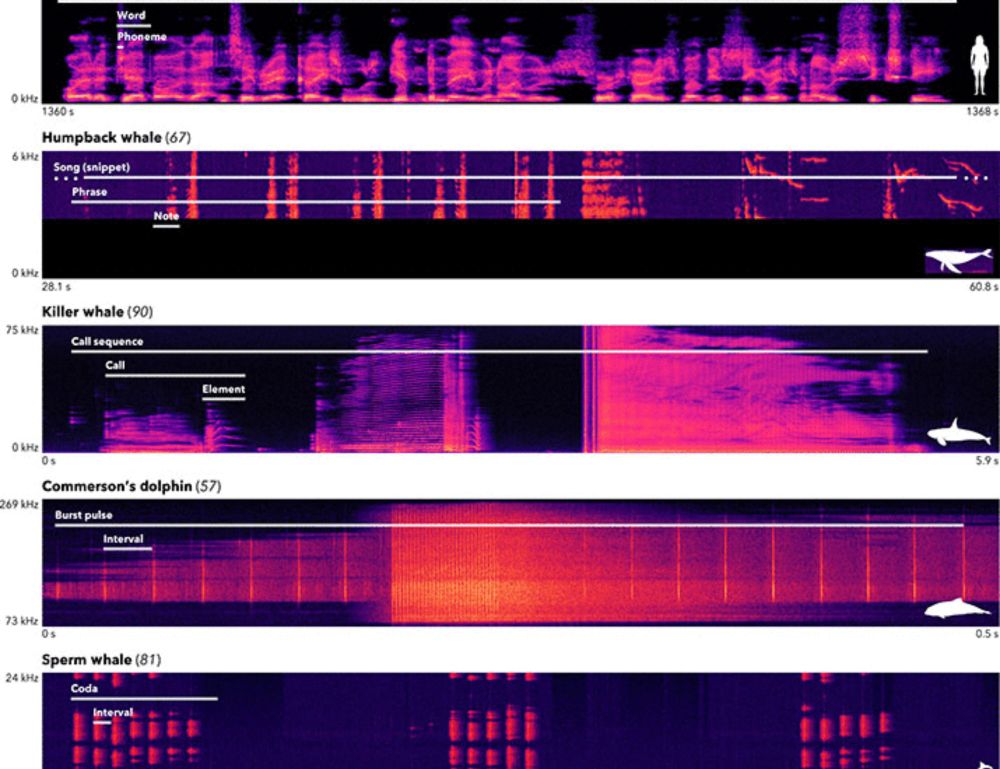
Language-like efficiency in whale communication
Whale vocalizations follow efficiency rules seen in human language, revealing striking similarities in communication systems.
Do whales optimize their vocalizations for efficiency, just like human language? 🐋🎶 My latest study in
Science Advances (@science.org) suggests they do—following linguistic laws seen in human speech. 🧵 www.science.org/doi/10.1126/...
05.02.2025 19:13 — 👍 204 🔁 66 💬 5 📌 3
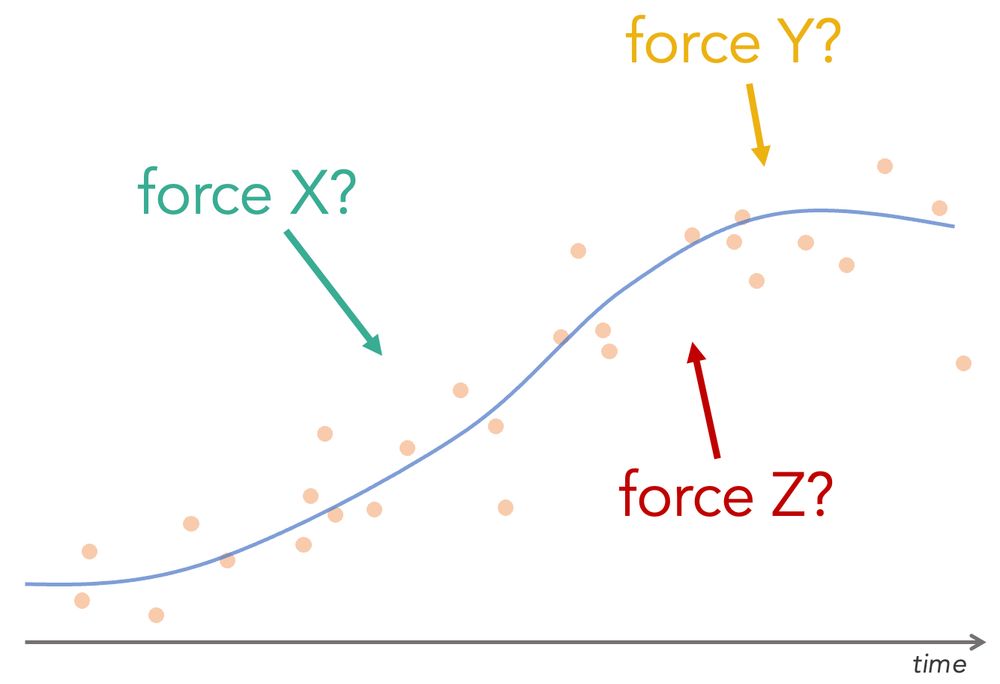
a schematic depiction of a trend line and several causal forces that give it its shape
Change over time is often depicted as a trendline. But what does shape a trendline? Which forces? Our new paper presents a method allowing to “decompose” trendlines into constituent forces. Also, we tackle an old puzzle: Does culture change “one funeral at a time”? 🧵(1/8) doi.org/10.1098/rspb...
05.02.2025 14:53 — 👍 93 🔁 39 💬 2 📌 6
🏰 PhD position on computational modelling | collective dynamics | cultural evolution 🏰
Get in touch with any questions you might have and join me in beautiful Marburg!
stellenangebote.uni-marburg.de/jobposting/c... (Deutsch)
stellenangebote.uni-marburg.de/jobposting/3... (English)
03.02.2025 08:52 — 👍 86 🔁 92 💬 2 📌 5
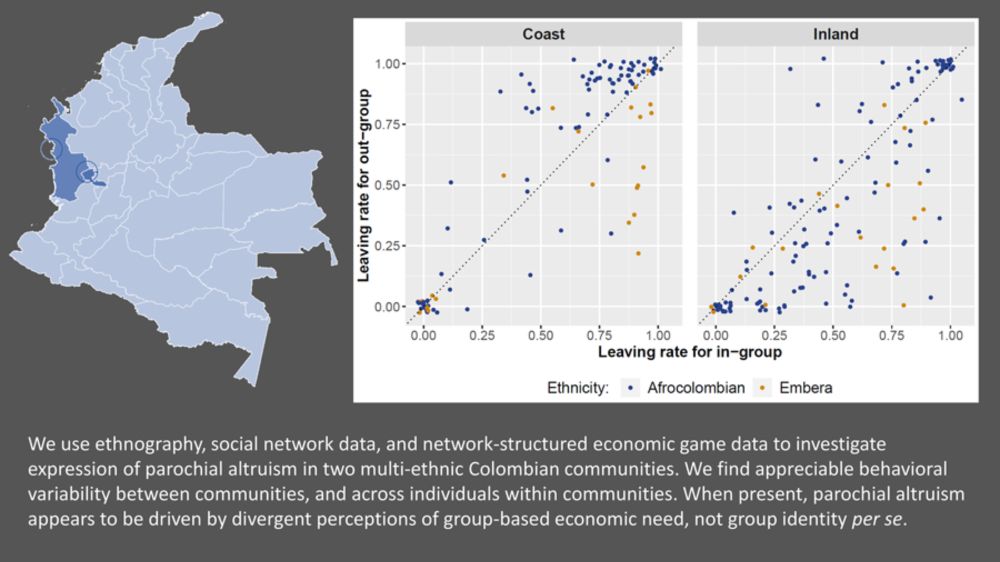
Perceived inequality and variability in the expression of parochial altruism | Evolutionary Human Sciences | Cambridge Core
Perceived inequality and variability in the expression of parochial altruism - Volume 7
"It's us vs them." Is it always? …and if it isn’t, when might it be them = us, or even them > us?? In a new paper, Cody Ross and I find that perceived cooperativeness and need can flip the equation. Here’s a thread 👇🏻 and here’s the paper: doi.org/10.1017/ehs.... /1
04.02.2025 15:10 — 👍 25 🔁 16 💬 2 📌 0
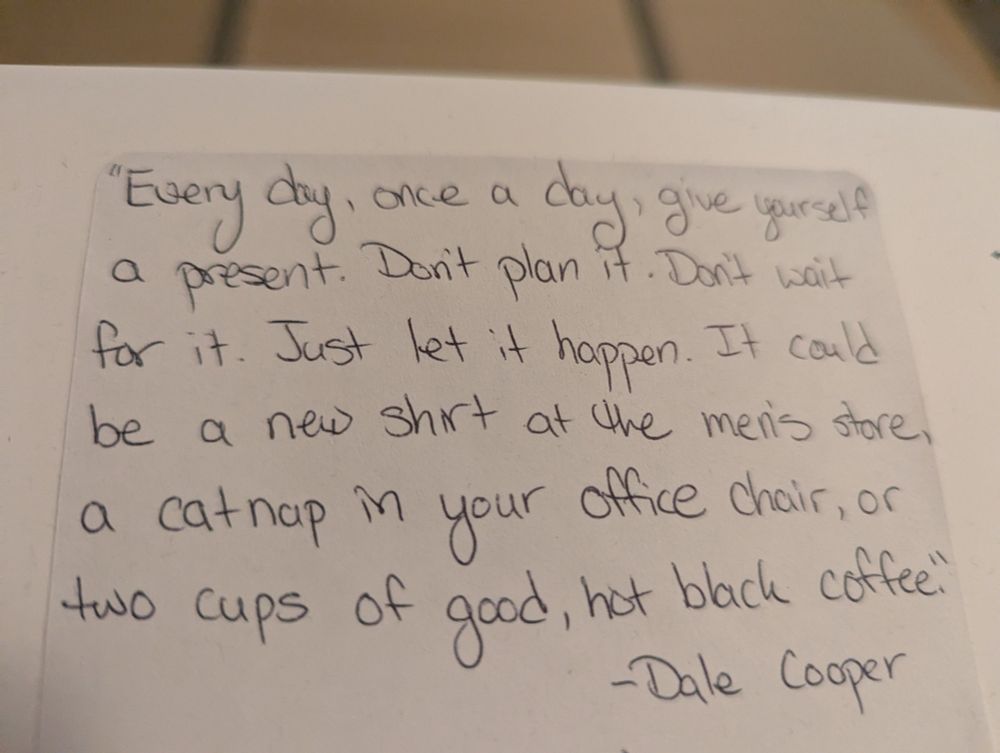
Good words to remember when things are falling apart...
04.02.2025 03:54 — 👍 0 🔁 0 💬 0 📌 0
Internet Archive: Digital Library of Free & Borrowable Texts, Movies, Music & Wayback Machine
Alt-librarians, alt-IT?
This is definitely the best way to thank them.
archive.org/donate
They are never flush with enough money to thrive.
02.02.2025 19:54 — 👍 95 🔁 20 💬 1 📌 1
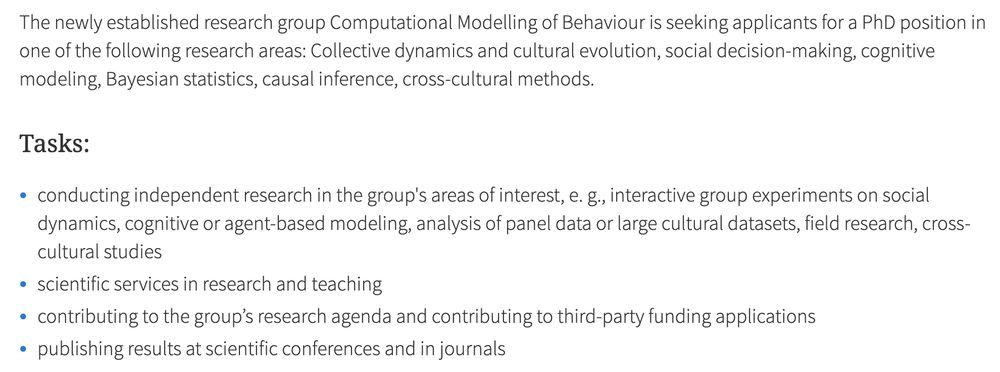
The newly established research group Computational Modelling of Behaviour is seeking applicants for a PhD position in one of the following research areas: Collective dynamics and cultural evolution, social decision-making, cognitive modeling, Bayesian statistics, causal inference, cross-cultural methods.
Tasks:
conducting independent research in the group's areas of interest, e. g., interactive group experiments on social dynamics, cognitive or agent-based modeling, analysis of panel data or large cultural datasets, field research, cross-cultural studies
scientific services in research and teaching
contributing to the group’s research agenda and contributing to third-party funding applications
publishing results at scientific conferences and in journals
My former PhD @dominikdeffner.bsky.social is now a professor and is looking for a PhD student. Know someone who would fit? stellenangebote.uni-marburg.de/jobposting/3...
03.02.2025 08:39 — 👍 20 🔁 25 💬 0 📌 2
"The Special Feature 'Half a Century of Cultural Evolution' assembles answers from a broad array of scientific disciplines with vastly different views on culture, but with one uniting theme: that culture evolves."
Open access
www.pnas.org/topic/565
29.01.2025 13:01 — 👍 1 🔁 6 💬 1 📌 0
I generally enjoy reviewing papers, especially in interdisciplinary venues, but the increasing number of method-in-search-of-a-problem papers is unfortunate. Especially since the methods are now complex Rube-Goldberg machines made out of LLMs.
31.01.2025 20:58 — 👍 5 🔁 1 💬 0 📌 0
Sociedad de Estudios de Bioarqueología del Cuidado (SEBioC) https://sebioc.org/
Asst. Prof. in Psychological and Brain Sciences and Anthropology @ UC Santa Barbara | UC PPFP Fellow | Fascinated by great ape social cognition!
https://www.laurasimonelewis.com/
https://www.originsofmindlab.com/
Interested in everything at the intersection of evo-eco-genetics-omics | Full time Kokkonut and PhD student at JGU Mainz, Germany | Previously at EES LMU, Munich and Azim Premji University, Bangalore
🧬🌿👩💻🙆♀️
24, she/her
Evolutionary anthropology, human behavioral ecology, cultural evolution. Research fellow at the Institute for Advanced Studies in Toulouse. Dog owner and animal lover.
Post-doctoral researcher at Karolinska Institute. I study social cognition and social learning using a mix of experiments, computational models and simulations.
Duke’ 24 | Behavioral Science for Policy Lab Manager @ Princeton University| 🇻🇪🇪🇸
Interested in social cognition, memory, collaboration, organizational psychology, environmental decision-making, and media 🧠🎥
I’m interested in anthropology, evolution, and maps
Head of Molecular Psychiatry and Neurodegeneration Laboratory at Heinrich Heine University of Düsseldorf, Germany. Transmission and co-evolution mechanisms for brain function from the molecular to the individual/organismal level.
phd candidate @ucsantabarbara |> psychological and brain sciences |> evolutionary and computational perspective |> computational mate choice lab |> mate choice psychology
Psych PhD Candidate at UCSB || Student Social Media Officer for W+EBS || evolutionary psychology/human mating || she/her
Psychology PhD student at Arizona State University.
Incoming psych PhD student @ UC Santa Barbara
evolutionary psychology | computational modeling | group dynamics
Postdoc at ETHz - Associate Editor HSScomms
Exploring Opinion Dynamics and Collective Intelligence with social simulations and belief networks.
The Cognitive & Information Sciences Department at UC Merced, offering cutting edge interdisciplinary undergraduate and graduate training at the University of California's 10th campus.
Research Fellow, University of Oxford
Theology, philosophy, ethics, politics, environmental humanities
Associate Director @LSRIOxford
Anglican Priest
https://www.theology.ox.ac.uk/people/revd-dr-timothy-howles
ion foundation endowed prof | university of utah | cognition, AI, generative rationality, theory-based view, causal reasoning, economics, strategy
Explore the mind's quirks through cognitive science on the cognitations podcast. Recorded @ Cambridge, ENS-PSL & Uni Grenoble Alpes.
Listen now: tinyurl.com/4xcczc4n
Lecturer @kcl-spe.bsky.social @kingscollegelondon.bsky.social
Game Theory, Econ & CS, Pol-Econ, Sport
Chess ♟️
Game Theory Corner at Norway Chess
Studied in Istanbul -> Paris -> Bielefeld -> Maastricht
https://linktr.ee/drmehmetismail
Views are my own
This is the home of the Mycenaean Atlas Project. The M.A.P. is the most accurate gazetteer and analysis tool for Bronze Age sites in Greece, Crete, the islands, and Anatolia.
www.helladic.info










